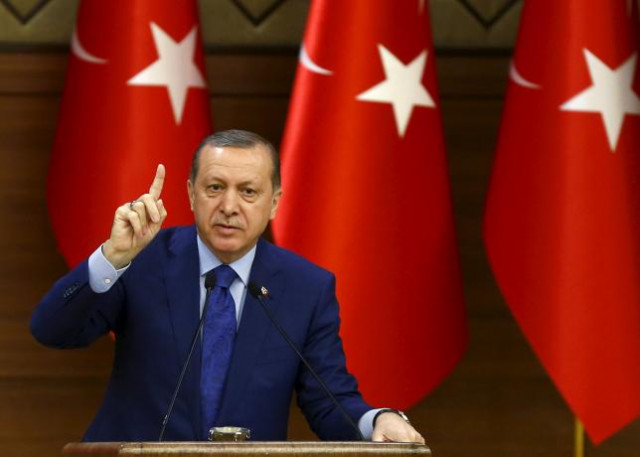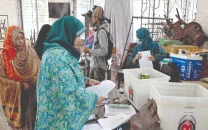With coup defeated, Erdogan eyes vote on revamped powers
Plan to create a presidential system means Turkey is likely to be heading to a referendum next year

Turkish President Recep Tayyip Erdogan. PHOTO: REUTERS
The plan to create a presidential system means Turkey is likely to be heading to a referendum in the first half of next year, analysts say. This may create more instability for Turkey's fragile economy and exacerbate already simmering tensions in society, after Erdogan defeated the biggest challenge to his 13-year rule. But it will also allow the leader to settle for once and for all the question of his powers.
Erdogan says extending state of emergency would be good for Turkey
Only a month after becoming prime minister in March 2003 Erdogan told an interviewer that his "desire" was for a presidential system in Turkey, similar to the one in the United States. After being elected president in August 2014 and defeating the coup bid in July, Erdogan is more determined than ever to fulfil his desire and push forward with his plans.
Government officials argue a fully presidential system is needed to legalise what has become a de-facto situation, with Erdogan Turkey's undisputed number one after transforming the office of head of state. To change the constitution the ruling Justice and Development Party (AKP) co-founded by Erdogan needs a super-majority of 367 votes.
The AKP only has 316 seats (excluding the speaker Ismail Kahraman) in the 550-seat national assembly. But to put forward the changes to the public in a referendum, the party needs only 330 votes, which could happen if the 40-seat Nationalist Movement Party (MHP) of Devlet Bahceli gives its support. The two other opposition parties are likely to be against.
Bahceli has not indicated whether his party's MPs will give the government their support but on Tuesday gave his firmest indication yet it could be prepared to allow the referendum to go ahead. Fadi Hakura, Turkey expert at Chatham House think tank in London, said that so far the Bahceli's statements indicate "willingness to collaborate" with the AKP to bring about a referendum. He added there was a "real possibility" the system would be approved in a referendum but warned that the current polarisation in Turkey would worsen.
Turkey fears Russia-US war over Syria
"The presidential system will further intensify the ideological polarisation and entrenched conservatism.
"(It) will further intensify the existing political, ideological and sectarian divisions bedevilling Turkish politics and society," he said. The uncertainty since the issue rose back to the top of the agenda has also hurt the Turkish lira, which has lost over four per cent in value against the US dollar over the last month.
Some experts suggest the president could even be tempted to call early legislative elections in 2017 although the government has denied having any such idea. Michael Harris, global head of research at investment bank Renaissance Capital, warned in a note that the Turkish economy was "on hold" until Erdogan achieved his objectives.
According to Harris, if Erdogan tries to win a super-majority through an early election, it would be the "crux of why we continue to recommend investors take money out of the country". But if Erdogan is able to achieve the executive presidency in an accelerated and smoother process, Turkey could find "political equilibrium in 2017", he said.
Prime Minister Binali Yildirim on Tuesday said it would be brought to parliament "very soon" because the changes were needed to "eliminate confusion from the system". Justice Minister Bekir Bozdag suggested last week a referendum on a presidential system could come as early as spring 2017. The authorities are confident of winning a symbolic and convincing victory, which would be Turkey's fourth major national poll in as many years. Polls after the coup showed that its defeat had substantially bolstered Erdogan's ratings while a poll published on Tuesday in the pro-government Daily Sabah newspaper said 63 per cent supported the presidential system.
Erdogan says Clinton comments on arming Kurds 'politically inept'
"In Turkey people see a close relationship between Erdogan and the presidential system," said Mehmet Ali Kulat, the head of the MAK research company which conducted face-to-face interviews with 5,400 people between October 10 and 15.
"What they support more is Erdogan rather than a presidential system," he told AFP.



















COMMENTS
Comments are moderated and generally will be posted if they are on-topic and not abusive.
For more information, please see our Comments FAQ